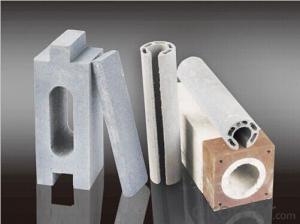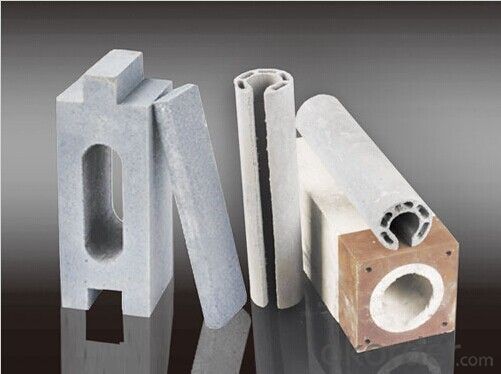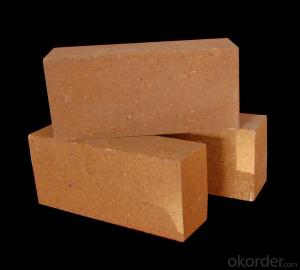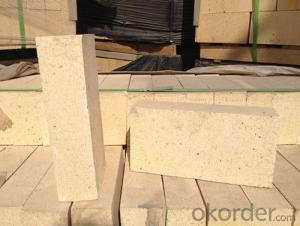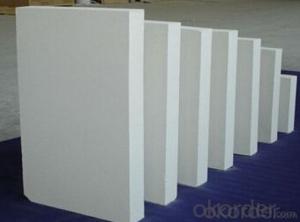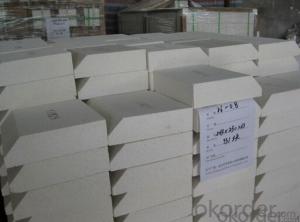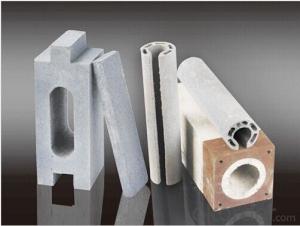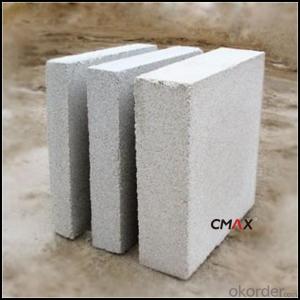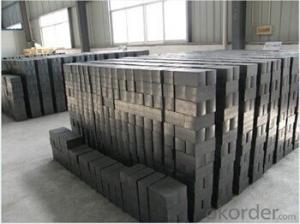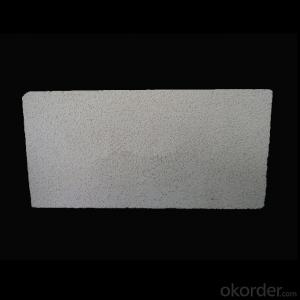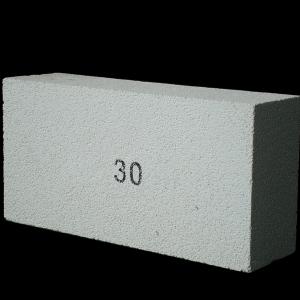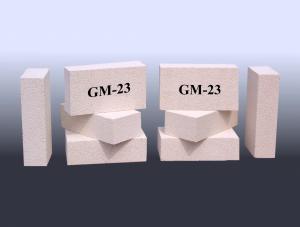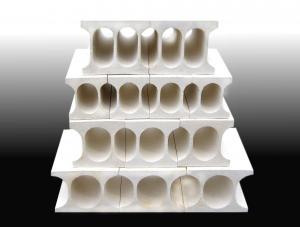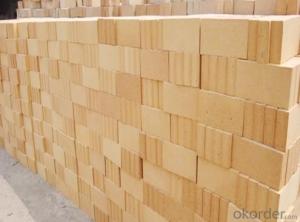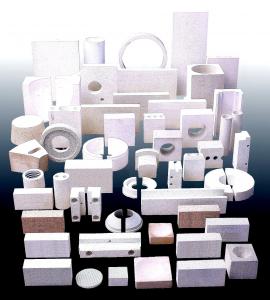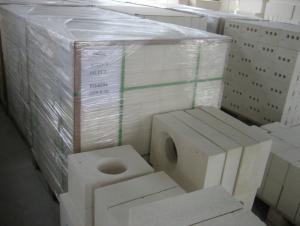Silicon Nitride-Carborundum Insulating Fire Brick
- Loading Port:
- China Main Port
- Payment Terms:
- TT OR LC
- Min Order Qty:
- -
- Supply Capability:
- -
OKorder Service Pledge
OKorder Financial Service
You Might Also Like
1. Characteristic
High strength
Low thermal expansion coefficient
Good thermal conductivity and thermal shock resistance
Good resistance to liquid aluminum erosion capability
High erosion
2. Applications
Widely used in large aluminum electrolytic cell of lining material. In the electrolytic aluminium industry, because of nitride bonded silicon carbide products can be made thin wall lining, enlarge the tank capacity, improve the thermal conductivity, can rapid cooling, and they are permitted to enter a higher power, increase the tank production capacity, at the same time, in its surface can form alumina and cryolite of eutectic content, in order to protect the tank lining work layer, prolong service life, therefore, this product is aluminum industry generally welcome.
3. Physical and Chemical Index of silicon nitride bonded silicon brick used in cooling stave
| ITEM | INDEX | |||||||
| SiC % | 72 Min | |||||||
| Si3N4 % | 21 Min | |||||||
| Fe2O3 % | 0.5 Max | |||||||
| Porosity % | 18 Max | |||||||
| Bulk density g/cm3 | 2.65-2.70 | |||||||
| Bending strength MPa | Room temperature °C | 42 | ||||||
| 1400 °C | 45 | |||||||
| CCS MPa | 150 Min | |||||||
| Thermal conductivity w/m·k 1250 °C | 15-18 | |||||||
| Tolerance | 0-100 mm | ±1.0 | ||||||
| 101-300 mm | ±1.5 | |||||||
| 301-500 mm | ±2.0 | |||||||
| More than 500 mm | ±0.5% | |||||||
| Surface irregularity | 0.2 Max | |||||||
| Face verticality | 0.5 Max | |||||||
| Diagonal difference | 2 Max | |||||||
- Q: Can insulating fire bricks be used in incinerators?
- Yes, insulating fire bricks can be used in incinerators. Insulating fire bricks are specially designed to provide excellent thermal insulation, making them ideal for applications where high temperatures need to be maintained. In incinerators, which operate at extremely high temperatures, insulating fire bricks can help to reduce heat loss and improve the overall energy efficiency of the system. Additionally, these bricks have good resistance to thermal shock, which is crucial in incinerators where rapid temperature changes occur. Therefore, using insulating fire bricks in incinerators can help to enhance their performance and longevity.
- Q: Are insulating fire bricks fireproof?
- Indeed, insulating fire bricks possess fireproof properties. Their design allows them to endure elevated temperatures while offering insulation to impede heat transfer. Composed of refractory materials with a high melting point, insulating fire bricks can withstand intense heat without disintegrating or liquefying. These bricks are frequently employed in scenarios involving high temperatures, such as kilns, furnaces, fireplaces, and ovens. As a means of fireproofing, insulating fire bricks are highly recommended due to their exceptional thermal insulation capabilities and their ability to effectively safeguard against the propagation of fire.
- Q: Do insulating fire bricks require any special installation techniques?
- Special installation techniques are necessary for insulating fire bricks. These bricks are designed to offer excellent thermal insulation, so proper installation is essential for optimal performance. To begin, it is crucial to have a clean and debris-free installation surface. This creates a strong and stable foundation for the bricks. Afterward, it is important to use a suitable refractory mortar or adhesive to secure the bricks in place. This mortar should be specifically designed for high-temperature applications and capable of withstanding thermal expansion and contraction during heating and cooling cycles. During installation, attention should be given to filling the joints between the bricks with mortar. This prevents heat loss and maintains the insulating properties of the bricks. Furthermore, careful stacking and alignment of the insulating fire bricks is necessary to ensure a tight fit and minimize gaps. This maximizes insulation and prevents heat leakage. Lastly, it is advisable to consult the manufacturer's guidelines and follow their recommended installation techniques. Different types of insulating fire bricks may have specific requirements that must be adhered to for proper installation. In summary, insulating fire bricks demand special installation techniques to ensure their effectiveness and longevity. Following proper installation practices will enhance the thermal insulation properties of these bricks and optimize their performance.
- Q: Can insulating fire bricks be used in the construction of combustion chambers for rocket engines?
- Insulating fire bricks are capable of being utilized in the construction of rocket engine combustion chambers. They are specifically engineered to endure elevated temperatures and provide exceptional thermal insulation. This makes them an ideal option for situations involving extreme heat, such as rocket engine combustion chambers. The main purpose of insulating fire bricks in a rocket engine's combustion chamber is to shield the surrounding structure from the intense heat generated during combustion. By offering insulation, these bricks aid in minimizing the transfer of heat to the outer walls of the combustion chamber, thus averting damage and ensuring the chamber's structural integrity. Moreover, insulating fire bricks possess a lightweight composition and exhibit low thermal conductivity, enabling them to effectively retain heat within the combustion chamber. This characteristic is vital for maintaining optimal combustion efficiency and enhancing rocket performance. In addition to their thermal properties, insulating fire bricks are recognized for their durability and resistance to thermal shock. This attribute is particularly valuable in rocket engine applications where rapid temperature fluctuations can occur, such as during ignition or shutdown sequences. The ability of insulating fire bricks to endure such thermal stresses is imperative for the dependable operation and extended lifespan of the combustion chamber. Overall, insulating fire bricks are a suitable choice for constructing combustion chambers in rocket engines due to their ability to withstand high temperatures, provide thermal insulation, possess a lightweight nature, and exhibit durability.
- Q: Are insulating fire bricks easy to cut and shape?
- Indeed, cutting and shaping insulating fire bricks proves to be relatively simple. These bricks consist of lightweight refractory materials like ceramic fibers, enabling them to be more manageable when compared to traditional fire bricks. Common tools such as saws, knives, or chisels can be employed to cut and shape these insulating fire bricks. Due to their lightweight composition, they can be easily maneuvered and positioned, facilitating more accurate cuts and shapes. Moreover, if necessary, openings or specific designs can be effortlessly drilled or carved into these bricks. Overall, the convenience of cutting and shaping insulating fire bricks makes them an ideal choice for various applications in construction, insulation, and fireproofing.
- Q: Can insulating fire bricks be custom-made?
- Indeed, it is possible to manufacture insulating fire bricks according to specific specifications. Typically, insulating fire bricks are crafted using lightweight materials like vermiculite, perlite, or refractory fibers, which are easily shaped into various forms and sizes. With this versatility, manufacturers can produce tailor-made insulating fire bricks to cater to specific demands and purposes. The customization options available may involve alterations in dimensions, thermal conductivity, compressive strength, and density. By adjusting the composition and design of the insulating fire bricks, they can be optimized to function optimally within specific temperature ranges, insulation requirements, and environmental conditions. Consequently, customers have the opportunity to collaborate with manufacturers in order to develop personalized solutions that perfectly align with their individual requirements.
- Q: Do insulating fire bricks have a high compressive strength?
- Yes, insulating fire bricks typically have a high compressive strength due to their dense and sturdy composition.
- Q: Are insulating fire bricks suitable for use in ceramic fiber modules?
- Insulating fire bricks should not be used in ceramic fiber modules. These two materials are composed of different substances and possess distinct characteristics. Insulating fire bricks are typically crafted from dense refractory materials like clay or alumina, which grant them exceptional thermal insulation properties. Conversely, ceramic fiber modules are constructed with lightweight ceramic fibers and are intended for insulation and heat containment in high-temperature settings. They exhibit remarkable resistance to thermal shock and can withstand sudden temperature fluctuations. Employing insulating fire bricks in ceramic fiber modules would not yield the same insulation and heat containment capabilities as using proper ceramic fiber modules. This may result in inadequate performance and reduced efficiency when subjected to high temperatures. Consequently, it is crucial to utilize appropriate materials for specific applications in order to ensure optimal performance and safety.
- Q: Can insulating fire bricks reduce heating or cooling costs?
- Yes, insulating fire bricks can help reduce heating or cooling costs. These bricks are designed to have low thermal conductivity, which means they prevent heat transfer between the indoor and outdoor environment. By using insulating fire bricks to build or line the walls of a building, less heat is lost during the colder months and less heat is gained during the hotter months. This can result in lower energy consumption and reduced heating or cooling expenses.
- Q: Do insulating fire bricks require any special insulation blankets or jackets?
- Yes, insulating fire bricks do require special insulation blankets or jackets in order to enhance their insulating properties and protect them from heat loss and damage. These blankets or jackets help to create a barrier that prevents the transfer of heat, ensuring maximum insulation and energy efficiency.
Send your message to us
Silicon Nitride-Carborundum Insulating Fire Brick
- Loading Port:
- China Main Port
- Payment Terms:
- TT OR LC
- Min Order Qty:
- -
- Supply Capability:
- -
OKorder Service Pledge
OKorder Financial Service
Similar products
Hot products
Hot Searches
Related keywords
